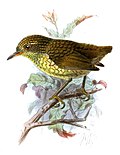
The gnateaters are a bird family, Conopophagidae, consisting of twelve small suboscine passerine species in two genera, which occur in South and Central America.
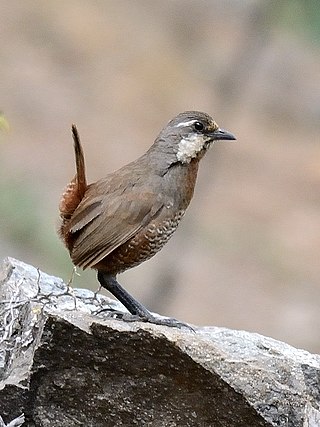
The tapaculos or tapacolos are a family, Rhinocryptidae, of small suboscine passerine birds, found mainly in South America and with the highest diversity in the Andean regions. Three species are found in southern Central America.

Formicariidae is a family of smallish suboscine passerine birds of subtropical and tropical Central and South America known as antthrushes. They are between 10 and 20 cm in length, and are most closely related to the ovenbirds in the family Furnariidae, and the tapaculos in the family Rhinocryptidae. The family Formicariidae contains 12 species in two genera.

The Magellanic tapaculo is a small passerine bird in the tapaculo family Rhinocryptidae that is found in southern South America.

Scytalopus is a genus of small suboscine passerine birds belonging to the tapaculo family Rhinocryptidae. They are found in South and Central America from Tierra del Fuego to Costa Rica, but are absent from the Amazon Basin. They inhabit dense vegetation at or near ground-level and are mainly found in mountainous regions, particularly the Andes. They can be very difficult to see as they run through the undergrowth in a mouse-like fashion.

The marsh tapaculo is a recently discovered passerine bird which belongs to the genus Scytalopus, a genus of tapaculos. It is also known as the wetland tapaculo or tall-grass wetland tapaculo. It is endemic to Brazil.

The ochre-flanked tapaculo is a species of bird in the family Rhinocryptidae. It is found in south-central Chile and adjacent western Argentina.

The rusty-belted tapaculo is a species of suboscine passerine bird in the tapaculo family Rhinocryptidae. It is the only species placed in the genus Liosceles. It is found in Brazil, Bolivia, Colombia, Ecuador, and Peru.
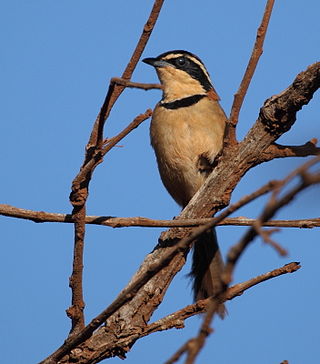
The crescentchests are a genus, Melanopareia, of suboscine passerine birds from South America. The genus has long been placed with the tapaculos in the family Rhinocryptidae. Their placement there has been questioned and in 2007 the genus was placed in its own family, Melanopareiidae, by the South American Classification Committee. Subsequently, the family was accepted by the International Ornithological Congress Bird List and the Clements Checklist. The family Melanopareiidae was formally erected in 2009.

The ash-colored tapaculo is a species of bird in the family Rhinocryptidae. It is found in Colombia, Ecuador, and Peru.
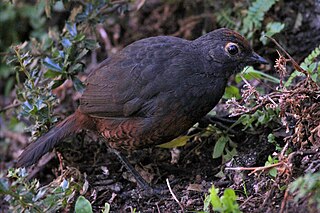
The black-throated huet-huetSpanish pronunciation:[wetwet] is a species of bird in the family Rhinocryptidae. It is found in southern/central Chile and adjacent western Argentina. Its natural habitat is temperate forest.

The white-breasted tapaculo is a species of bird in the family Rhinocryptidae. It is endemic to the Atlantic forest of southeastern Brazil.

The long-tailed tapaculo is a species of bird in the family Rhinocryptidae. It is found in the eastern Andes of Colombia, Ecuador and far northern Peru.

The Bahia tapaculo is a species of bird in the family Rhinocryptidae. It is endemic to lowland Atlantic forest in Bahia, Brazil.

The Ecuadorian tapaculo or El Oro tapaculo is a small passerine bird belonging to the genus Scytalopus, a genus of tapaculos. It is restricted to a small area in south-western Ecuador and was not described until 1997.

The Vilcabamba tapaculo is a small passerine bird in the family Rhinocryptidae. It is endemic to Peru.
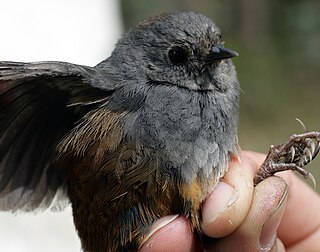
The Perijá tapaculo is a species of passerine bird in the family Rhinocryptidae (tapaculos). Endemic to the Serranía del Perijá mountain range on the Colombia–Venezuela border, the Perijá tapaculo is found at altitudes of 1,600–3,225 metres. Its body is 10 to 12 centimetres long and its tail is about 4 cm (1.6 in) long. Specimens have long been stored in museums, but the species was described only in 2015 based on sixteen specimens found between July 2008 and February 2009. It is considered vulnerable to extinction.

Maulino forest is a forest type naturally growing in the Chilean Coast Range of Central Chile from latitude 35°55 to 36°20 S. The forest grows in the transition zone between Mediterranean climate and humid temperate climate. Precipitation varies from 1000 to 700 mm/a and is concentrated in winter. According to geographers Humberto Fuenzalida and Edmundo Pisano the forest is one of mesophytes on the transition zone of temperate rain forests.

The white-winged tapaculo is a species of bird in the tapaculo family, Rhinocryptidae. It was described in 2020 by the American ornithologist Tom Schulenberg and his colleagues. It is known only from north-central Peru, where it inhabits wet shrub forest and montane forest. White-winged tapaculos are small and drab birds, being mostly gray in color with brownish, barred upperparts and tails, and a distinctive patch of white on the wing. Adults are 10–11 cm (3.9–4.3 in) long; males weigh 18.0–20.8 g (0.63–0.73 oz) and females weigh 16.5–18.0 g (0.58–0.63 oz). Despite their relatively distinctive appearance, their cryptic nature means that they are typically best identified by their vocalizations.

























